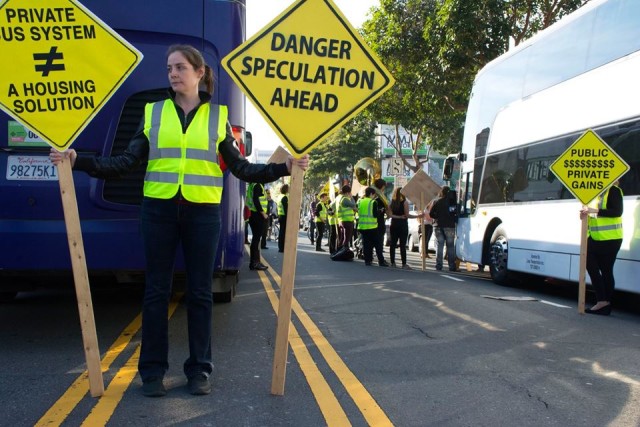A few hours before the Board of Supes debated the future of the Google bus program, anti-eviction activists blocked six buses, demonstrating that public anger over the tech-driven displacement is still very much alive.

Google, Facebook and Yahoo buses were blocked at their routine stop at Valencia. At-risk tenants along with representatives from Causa Justa Just Cause, Heart of the City Collective, Housing Rights Committee of San Francisco, San Francisco Tenants Union, Eviction Free San Francisco, Anti-Eviction Mapping Project, Last 3 Percent, and Senior Disability Action were all present to reissue demands they made at a similar protest two years ago: End the two-tier system that allows luxury shuttles to serve one small part of the population and leads to displacement.
Erin McElroy, anti-eviction activist and one of the leading people behind the Anti-Eviction Mapping Project, said that it’s important to keep protesting. “It is important that these companies and the government know what impact these programs are having on the citizens” she said. The data collected by Anti-Eviction Mapping Project reveals that 69 percent of no-fault evictions each year occurred within four blocks of known shuttle stops.
Benito Santiago has been living on Valencia since 1977, but in November 2013 he received an eviction notice. “I wasn’t going to give up and I didn’t. I fought for a roof over my head, I fought against the eviction.” Santiago was introduced to groups like Eviction Free San Francisco “From then on, I just bring my drum, speak, chant and play at protests around the city.”
Leslie Dreyer, an interdisciplinary artist known for planning and designing several actions to bring attention to the tech boom’s impact on displacement, said that no matter what the supes do, the struggle against eviction is a much longer fight. She also said the bus protests aren’t an attack on tech workers. “We keep making it clear, this is not an attack on individuals,” she said. The protestors carried signs that said: “Off the bus join us.”
Dreyer said she had a long conversation with a Googler who got off the bus and said something that resonated with the activists: “It’s so much more than the buses right?”
A lot of tech workers may have moved to the city without knowing about or understanding the displacement crisis. But Tanea Lunsford, spokesperson for Last 3% of Black San Francisco, said she thinks that new residents need to take responsibility and give back to the city.
“This is how capitalism presents itself socially,” she said. “Much like settler colonialism where there is little to no sense of contributing back to the community. We are seeing this in Bayview and in other areas too, where women of color suffered from cancer and other diseases because of toxins but these areas are now being cleaned up nice and shiny to invite rich speculators and investors.”
In the interest of transparency, my partner works for a tech company and we recently moved to San Francisco.



